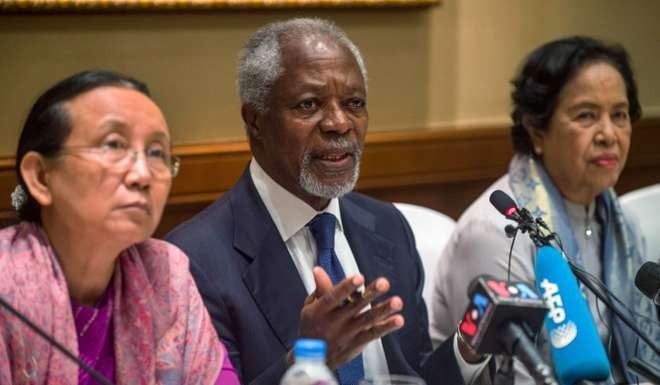
Why the Rohingya in Myanmar may not find a saviour in Suu Kyi
Nehginpao Kipgen says international censure has spurred the NLD government in Myanmar into taking positive steps, but concerns for the ethnic group are unlikely to trump majority interests

Myanmar pursuing ‘ethnic cleansing’ of Rohingya, UN says

PM Najib leads Malaysian protest against ‘genocide’ of Rohingya Muslims in Myanmar
Under international pressure, the Myanmese government set up a commission, led by Vice-President Myint Swe, to investigate the violence and the army’s role.
Myanmar government ‘following the law’ in Rakhine, probe panel says
However, Suu Kyi is unlikely to go beyond a zone of tolerance for a number of reasons. First, a large majority in Myanmar, including many ethnic minorities, consider the Rohingya to be illegal Bengali immigrants from neighbouring Bangladesh.
Watch: Aung San Suu Kyi addresses Rakhine troubles at the UN
Second, the government does not believe or anticipate that a third party, including the UN, would take drastic action to interfere in the internal affairs of Myanmar.
One year on in Myanmar, is Suu Kyi’s halo slipping?
Fourth, the government may continue its citizenship verification process in accordance with the 1982 citizenship law, which provides for three categories: full, associate and naturalised citizen.
Fifth, even if Suu Kyi personally wishes to introduce legislation favourable to the Rohingya, this would be difficult to implement under the existing constitution where the military controls the three key ministries of home, defence and border affairs.


Her recent comments in Singapore spoke volumes: “I’m not saying there are no difficulties, but it helps if people recognise the difficulties and are more focused on resolving these difficulties, rather than exaggerating them so that everything seems worse than it really is.”
Dr Nehginpao Kipgen is assistant professor and executive director of the Centre for Southeast Asian Studies, at Jindal School of International Affairs, O.P. Jindal Global University, India
